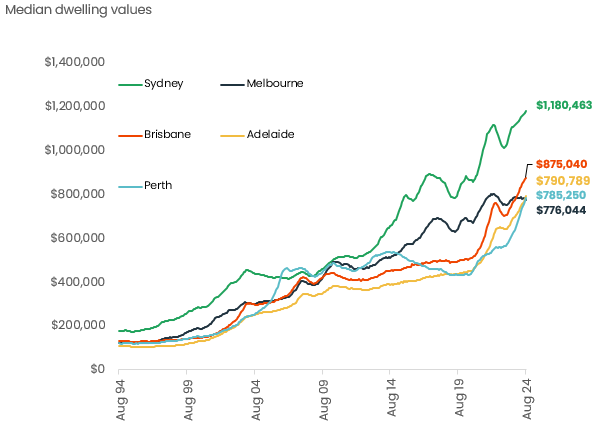If you’ve got more than one property or are planning to invest in property, your lender might suggest something called cross-collateralisation. It’s a common lending strategy, but one that comes with risks you need to understand.
Cross-collateralisation allows you to unlock equity in your existing properties without selling, but it also links your properties together in a way that can limit your flexibility.
What is cross-collateralisation?
Cross-collateralisation is when the same lender uses more than one property as security for a single loan, or for multiple loans that are linked across multiple properties. It means your lender can have a claim over several properties instead of just one.
For example, say you purchased your first home with a home loan through a mortgage broker in Melbourne. Later, you decide to invest in a second investment property and secure an investment property loan. If your lender cross-collateralises these properties, they will register a mortgage over both your primary residence and your investment property to secure both the loan for your home and the loan for your investment property. You can actually borrow 100% plus costs this way with a single loan if you have the equity available!
This also means you’re leveraging equity to grow your portfolio. But cross-collateralisation ties your properties together in a way that reduces your flexibility.
Why cross-collateralisation can limit your flexibility
One of the biggest drawbacks of cross-collateralisation is how it limits your ability to sell, refinance or restructure without involving all your properties and the bank’s assessment of the entire picture each time you make a decision.
If you decide to sell one of the properties in your cross-collateralised portfolio, you can’t just sell it and pocket the proceeds. You’ll need to get the lender’s approval, which usually triggers revaluations of any remaining properties, and they might use the sale to reassess your loan terms. They might even keep some or all of the proceeds to reduce your overall loan balance.
This kind of restriction can be frustrating for borrowers who want to:
- Refinance one property for a better deal
- Sell a property to free up cash
- Renovate or improve one part of their portfolio
Working with an experienced investment property loan broker can help you structure your loans in a way that supports flexibility and long-term growth.
Pros and cons of cross-collateralisation
Like any lending strategy, cross-collateralisation has its benefits and drawbacks. Here are some key points to consider:
Pros
1. Helps unlock equity quickly
Using the equity in one property can make it easier to secure finance for another without needing a large cash deposit or multiple loan applications to achieve the same thing across two or more lenders.
2. Creates simplicity
Some borrowers find it simpler to manage multiple loans under one lender, especially if they are new to property investment.
3. May improve borrowing power
By securing your loan across multiple properties, lenders may be more willing to offer a higher loan amount than if each property were assessed individually and with different lending polices applied.
Cons
1. Less flexibility when exiting
As explained, selling, refinancing or restructuring one property becomes more complex when it’s tied to others. Lender approval is required, and you may not receive all the sale proceeds if they need you to reduce your remaining loan balances.
2. Limited choice of lenders
If your properties are cross-collateralised, it can be difficult to switch just one loan to a different lender to get a more favourable interest rate or different terms. You might have to refinance all your loans simultaneously, which can be a complex and costly exercise.
3. Increased exposure to risk
If the value of one of your properties decreases significantly, it can impact the equity available across all your properties. This could lead to a situation where you owe more than the combined value of your properties.
What are the alternatives?
The alternative to cross-collateralisation is keeping your loans and securities separate. This approach is sometimes called “standalone” or “non-cross-securitised” lending.
With standalone lending:
Each loan is secured by just one property usually up to 80% of its value but up to 95% in some circumstances
- You can refinance, sell or restructure without affecting other properties
- You keep more control over your portfolio
A qualified mortgage broker can help you assess whether standalone or cross-collateralisation suits your strategy. It depends on your goals, equity, income and future plans.
Speak to an experienced mortgage broker before you decide
For some borrowers, cross-collateralisation can help unlock equity and support faster portfolio growth. But it’s not right for everyone and it’s something you should go into with your eyes open.
Before you agree to link your loans or properties, speak to a home loan broker who understands how to structure lending for the long term. An expert mortgage broker in Melbourne who clients trust will help you weigh the pros and cons, assess your risk, and explore smarter ways to use your equity.
Thinking about using cross-collateralisation to grow your property portfolio? Axton Finance can help. As a trusted mortgage broker in Melbourne, we’ll guide you through your options and make sure your loans are set up for long-term success. Call us on today 03 9939 7576, email [email protected] or click here to get in touch.










